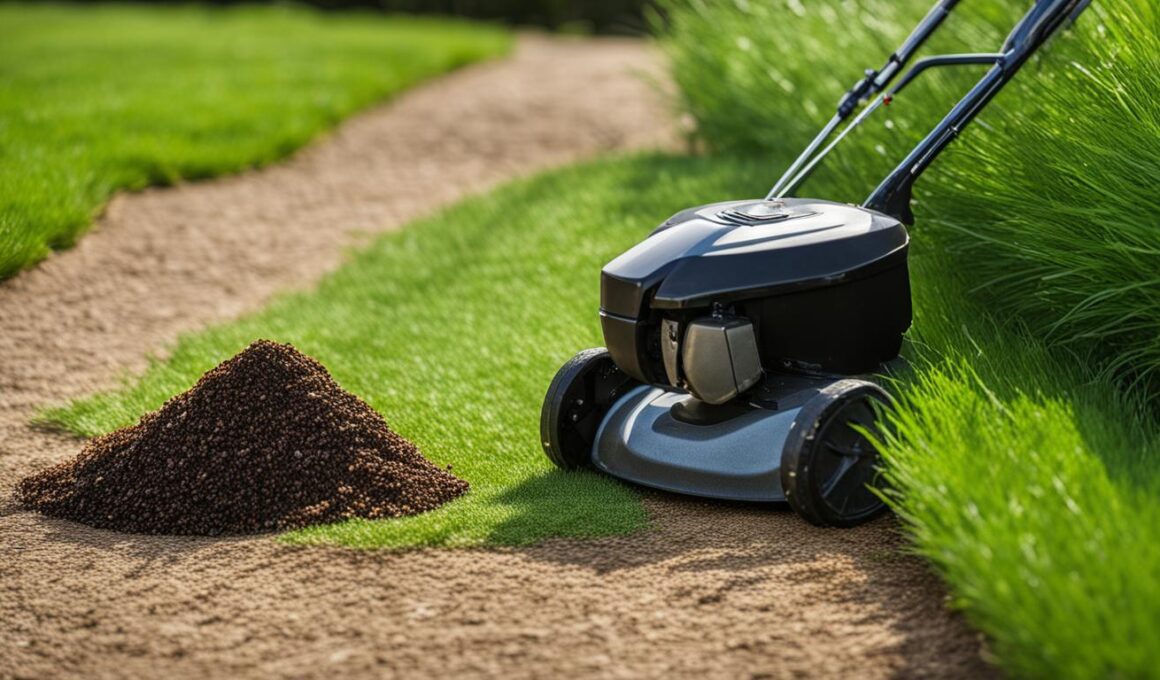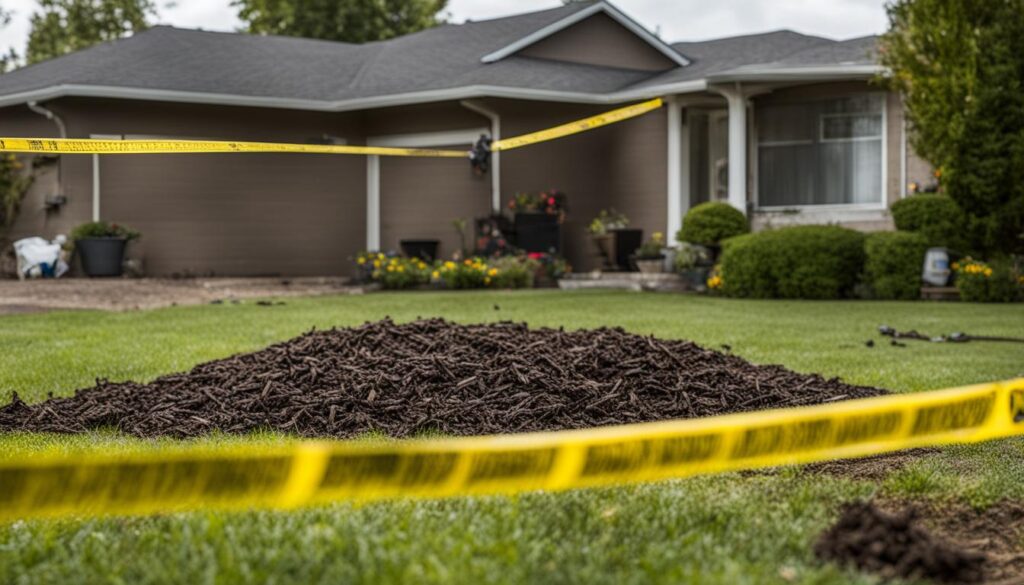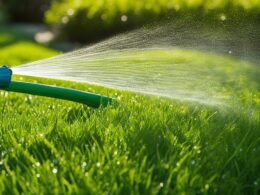Welcome to our article on mowing lawns with pets, where we address a common question: can you mow over dog poop? If you’re a pet owner who enjoys spending time outdoors in your yard, it’s essential to understand the potential risks and consequences of mowing over dog waste. In this article, we will explore the environmental and health hazards associated with dog poop, the effects of mowing over it, and the best practices for maintaining a pet-friendly yard.
Did you know that dog waste is not only an environmental pollutant but also a human health hazard? The Environmental Protection Agency (EPA) classifies doggie deposits as non-point source pollutants and notes that they can contribute enough bacteria to temporarily close a bay. Dog poop often carries disease-causing parasites and bacteria that can be transmitted directly to humans.
In the next sections, we will delve into the effects of mowing over dog poop, the dangers it poses to your yard and health, common lawn care myths, and best practices for managing pet waste. But first, let’s understand why mowing over dog poop is not a recommended solution.
The Effects of Mowing Over Dog Poop
Mowing over dog poop can have detrimental effects on your lawn and pose health risks. EPA classifies dog waste as an environmental pollutant, and leaving it on your lawn can lead to discoloration and even burns. The bacteria and diseases present in dog waste can be harmful to humans.
When you mow over dog poop, you unknowingly spread toxic chemicals all over your lawn. This not only damages the grass but also increases the risk of contracting zoonoses, which are diseases transmitted between animals and humans. Additionally, the eggs of roundworms and other parasites found in dog waste can survive in the soil for years, posing a danger to anyone using the backyard.
To prevent these negative effects, it is crucial to properly dispose of dog waste instead of mowing over it. This protects your lawn from damage and reduces the health risks associated with dog poop. By ensuring responsible waste management, you can maintain a healthy and safe environment for both your family and your pets.
The Dangers of Dog Poop in Your Yard
Dog poop is not only an unpleasant sight but also poses significant dangers to the environment and human health. Classified as an environmental pollutant by the EPA, dog waste contains up to 23 million fecal bacteria and can harbor various diseases, including whipworms, hookworms, and salmonellosis. The U.S. Centers for Disease Control and Prevention (CDC) highlights the potential risks of contracting diseases from pet droppings if not handled properly.
Leaving dog waste in your yard while mowing can have far-reaching consequences. It spreads toxic chemicals, increases the risk of zoonoses, and poses a threat to anyone on the property, including children and pets. The EPA classifies dog poop in the same category as toxic chemicals, emphasizing the importance of proper removal and disposal.
To provide a visual representation of the dangers associated with dog poop, take a look at the image below:
As you can see from the image, dog poop is not only unsightly but also a potential source of environmental pollution and health risks. It’s crucial to prioritize the proper removal of dog poop from your yard to ensure the health and safety of your family and community.
Lawn Care Myths About Dog Poop
When it comes to lawn care, there are many myths and misconceptions floating around, especially when it comes to dog poop. One common myth is that dog poop can be used as fertilizer for your lawn. However, this is a misconception that can actually damage your lawn and have negative consequences for its appearance and health.
Contrary to popular belief, dog poop is not a reliable source of nutrients for your grass. In fact, it can lead to discoloration and burns on your lawn. Dog waste contains bacteria and toxins that can harm the health of your grass and pose a risk to your family and pets.
The Environmental Protection Agency (EPA) and the Centers for Disease Control and Prevention (CDC) both consider dog waste a toxic chemical that should be promptly removed from your yard. It is important to understand that dog poop is an environmental pollutant and should not be treated as a natural fertilizer.
To emphasize the importance of proper waste disposal, it’s crucial to debunk this myth and raise awareness about the potential lawn damage caused by dog poop. By removing dog waste promptly and following proper waste disposal practices, you can ensure a clean, healthy, and beautiful lawn.
Proper lawn care involves regular maintenance, including mowing, watering, and fertilization using appropriate and safe products. Avoid falling for lawn care myths and always rely on evidence-based practices recommended by lawn care experts.
Best Practices for Pet-Friendly Yards
Creating a pet-friendly yard is essential for the well-being of your pets and the overall cleanliness of your outdoor space. Proper dog waste management and lawn maintenance are key factors in achieving this.
The first and foremost best practice is to always pick up after your pets. Regularly removing dog waste ensures a clean and safe environment for your family and community. Remember to use biodegradable waste bags for environmental-friendly disposal.
If your schedule makes it challenging to clean up after your pets, consider hiring a local pet waste management service. They specialize in efficient waste removal and disposal, giving you peace of mind and a hassle-free solution.
Alongside dog waste management, it is important to prioritize regular lawn maintenance. Mowing your lawn at the recommended height and frequency helps keep it healthy and free from any unwanted surprises. Proper watering and fertilization also contribute to maintaining a vibrant and lush lawn.
By following these best practices for pet-friendly yards, you can ensure a clean and enjoyable outdoor space for both you and your furry friends.
The Importance of Proper Waste Disposal
Proper waste disposal is crucial for minimizing the environmental impact and health hazards associated with dog waste. It is essential to understand the importance of disposing of dog poop correctly to protect the environment and the well-being of your community.
Leaving dog waste in your yard or mowing over it is not a viable solution. Dog poop is an environmental pollutant that can contaminate soil, water, and air. It contains harmful bacteria and parasites that can pose health risks to both humans and animals.
To ensure proper waste disposal, always pick up after your pets. Use biodegradable waste bags and dispose of the waste in designated waste bins or bags. Avoid flushing dog waste down the toilet or throwing it in regular trash bins, as this can lead to contamination of water sources.
Following local regulations for pet waste disposal is essential. Different municipalities may have specific guidelines for dog waste management. By adhering to these regulations, you contribute to a cleaner and safer environment.
Take the necessary steps to protect the environment and prevent the spread of health hazards related to dog waste. By practicing proper waste disposal, you can minimize the environmental impact, reduce the risk of disease transmission, and ensure the health and safety of your community.
Is it Safe to Mow Over Dog Poop on Wet Grass?
When it comes to mowing over dog poop on wet grass, it’s best to avoid it to prevent spreading the mess. Instead, wait for the lawn to dry or pick up the poop before mowing. Following these mowing tips for lawn can help keep your yard clean and healthy.
Conclusion
Mowing over dog poop is not recommended, as it can have negative consequences for both your lawn and your health. Dog waste is considered an environmental pollutant and can contain harmful bacteria and parasites that can be transmitted to humans. When you run a lawn mower over dog poop, it spreads the waste all over your yard, making it difficult to clean up and increasing the risk of contaminating the soil.
The best practice is to always pick up after your pets and properly dispose of their waste. This not only keeps your yard clean and odor-free but also helps prevent the spread of diseases and protects the environment. If you find it challenging to keep up with cleaning up after your pets, consider hiring a pet waste management service. They can take care of the waste removal and ensure proper disposal.
In addition to picking up after your pets, regular lawn maintenance is essential to keep your yard in good condition. Proper mowing and watering can help maintain a healthy and vibrant lawn while reducing the risk of spreading dog waste. By following these practices, you can enjoy a clean, safe, and pet-friendly yard for you and your furry companions.











